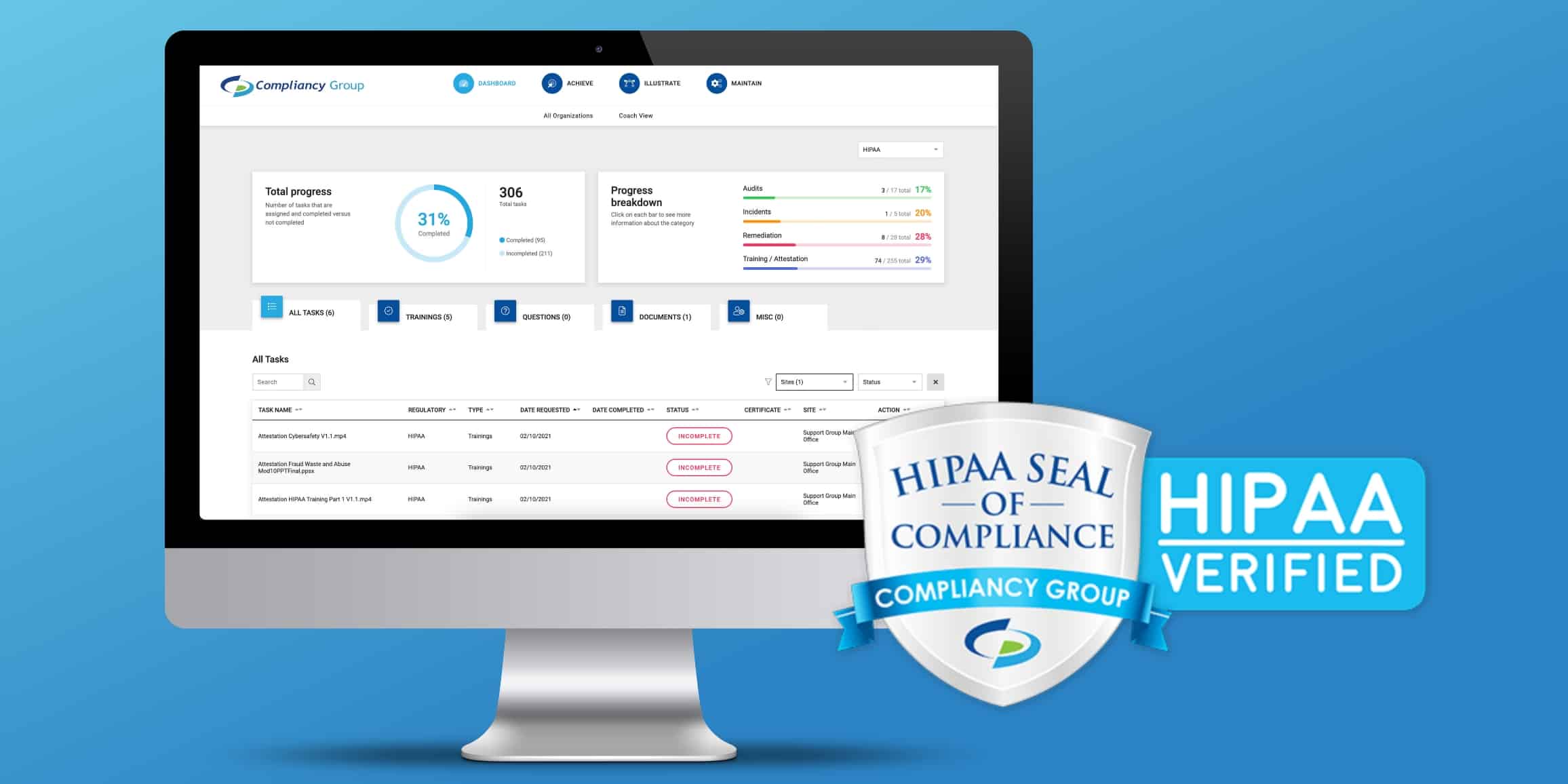How to Meet Your Healthcare Compliance Requirements
Healthcare compliance can be tricky. There is a lot of information out there, but most of it is inundated with legal jargon and technical language. You essentially need a legal degree to translate the regulatory requirements into a language you and your employees can understand. And your (and their) understanding is crucial to compliance in healthcare. So what do you do?
Well, healthcare compliance can be simplified into a handful of steps.
- Conduct security risk assessments
- Create and implement remediation plans
- Draft HIPAA policies and procedures
- Train employees
- Send and sign business associate agreements
- Track and report incidents
Compliance in Healthcare: How You Achieve it
Achieving HIPAA compliance in healthcare requires you to follow steps to implement a compliance program. Some of the steps are ones that you must take annually, which is why there is no HIPAA healthcare compliance certification recognized by the federal government.
Conduct Security Risk Assessments
HIPAA security risk assessments (SRAs) are vital to healthcare compliance. Why? As you go through the steps of your SRA, gaps in your compliance come to light. These can be slight deficiencies to significant issues that put your healthcare data at risk. Conducting an SRA is an annual requirement and key to managing your cybersecurity risk.
Create and Implement Remediation Plans
Remediation plans are plans for how your organization will address the compliance gaps found by conducting SRAs. HIPAA compliance in healthcare depends on creating and implementing these plans. This is because, without them, your organization will fail to adequately safeguard protected health information (PHI) which is the primary purpose of HIPAA.
Draft HIPAA Policies and Procedures
HIPAA policies and procedures must be custom created for a specific organization. Policies and procedures create guidelines for meeting HIPAA Privacy, Security, and Breach Notification Rule requirements. Effective policies and procedures dictate the proper uses and disclosures of PHI by your organization, how you protect PHI, and what to do if there is a PHI breach.
Train Employees
HIPAA training is essential to compliance in healthcare. How can employees be expected to follow HIPAA rules if they don’t know what they are? Training is another one of those annual healthcare compliance requirements. HIPAA training should include a basic overview of HIPAA, your organization’s policies and procedures, and cybersecurity best practices.
Send and Sign Business Associate Agreements
Business associate agreements are legal contracts that require each signing party to be HIPAA compliant and be responsible for their compliance. In essence, signed business associate agreements (BAAs) limit the liability for both parties in case of a breach, as only the liable party would be held culpable.
Whether you are a covered entity or a business associate, you must have signed business associate agreements. Covered entities must have a BAA with all of their business associate vendors, while business associates must have a BAA with their healthcare clients as well as any other BA they work with that has the potential to access their client’s data.
Track and Report Incidents
Incidents are bound to happen. It’s how you respond that is most important. When an incident affects the privacy or security of PHI, it is considered a HIPAA breach and must be reported. More minor incidents affecting less than 500 patients should be tracked throughout the year and reported by March 1st of the following year. However, incidents that affect 500 or more patients must be reported within 60 days of discovery.
Automate Your Healthcare Compliance
Becoming HIPAA compliant can take a lot of time and effort. Using a software tool drastically reduces the resources you need to devote to compliance.
Compliancy Group’s automated healthcare compliance software allows organizations to meet their HIPAA requirements quickly and at an affordable price. Everything you need for HIPAA is included!
With the software platform, you can:
- Conduct annual risk assessments, identify compliance gaps, and create remediation plans
- Implement customized HIPAA policies and procedures
- Train all staff, track their efforts, and store legal attestations
- Send and store business associate agreements
- Report incidents anonymously
Healthcare Compliance Certification
What is a healthcare compliance certification? Well, there is no such thing.
Since compliance is an ongoing process, the government does not recognize healthcare compliance certifications. However, there are third-party compliance verification methods that are industry-recognized.
Compliancy Group’s Seal of Compliance is a third-party HIPAA compliance verification tool. Compliancy Group’s HIPAA compliance software users receive their Seal of Compliance once their compliance program is verified and validated by staff. The Seal can be placed on an organization’s website, email signature, and marketing materials to represent its dedication to compliance.




